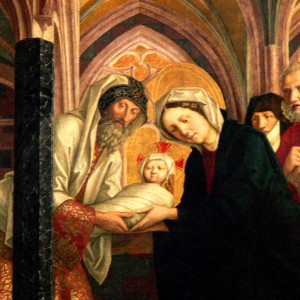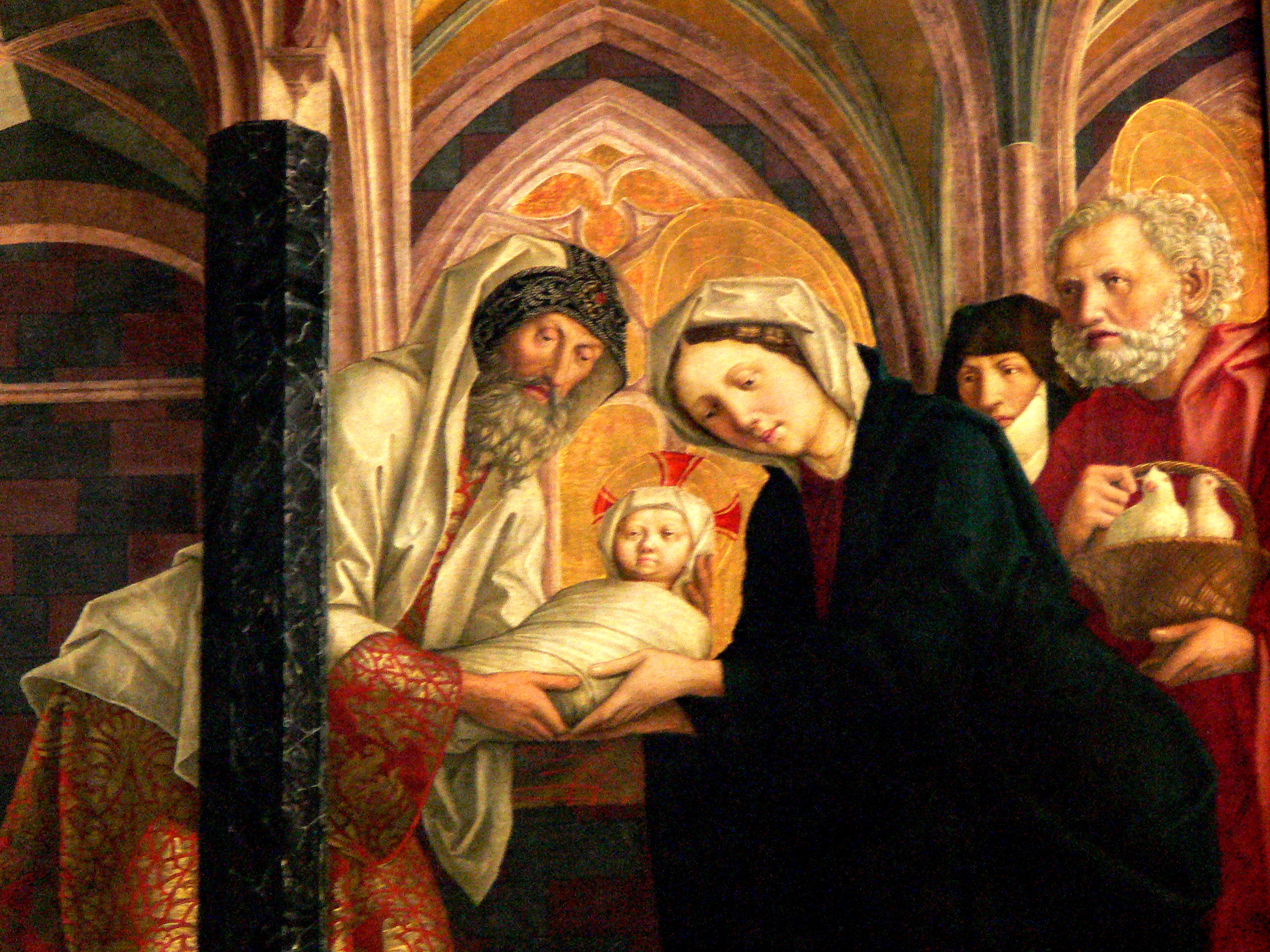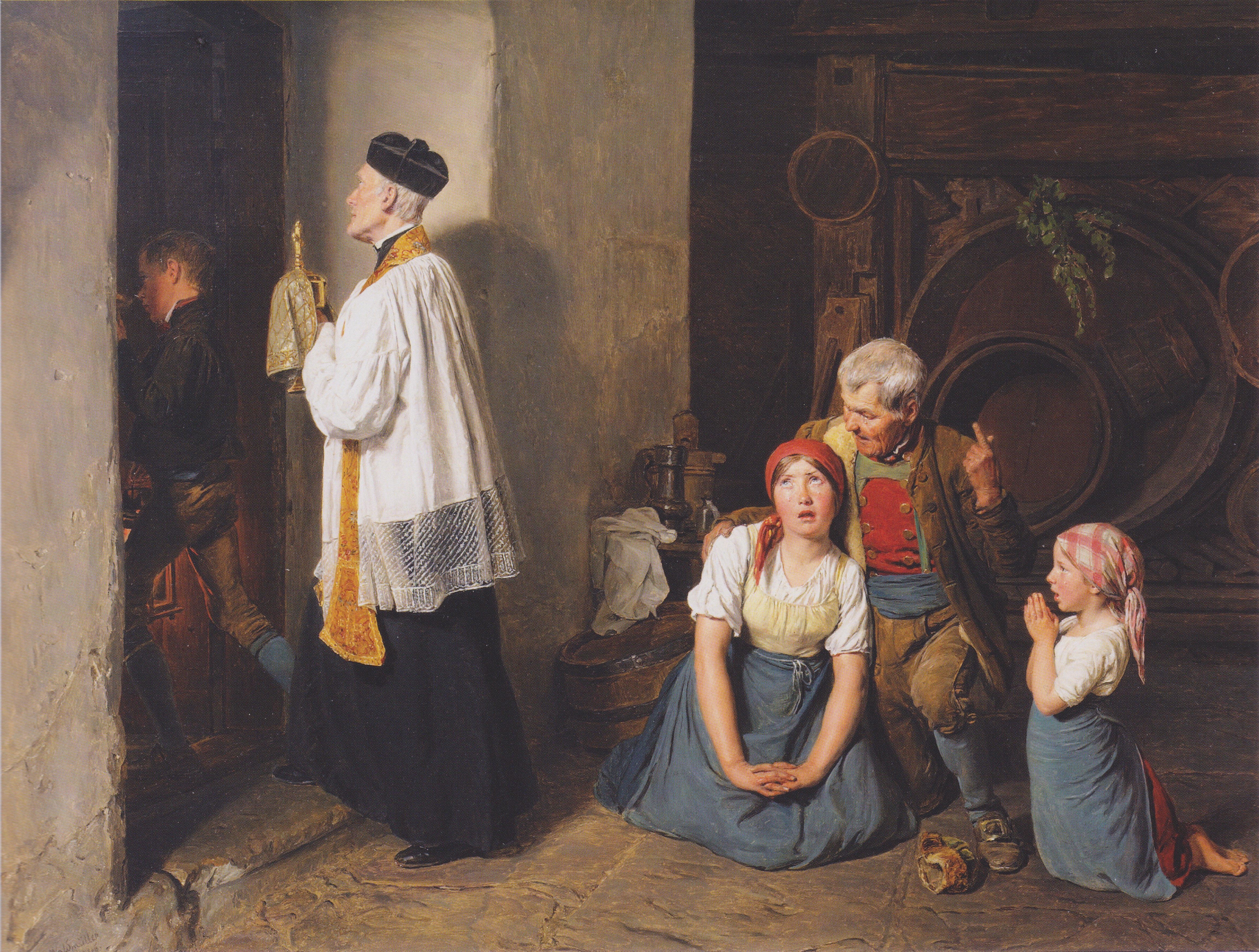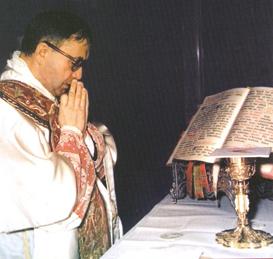Michael Pacher, Presentation of Christ (1481) Behold, I will send my messenger, and he shall prepare the way before me: and the LORD, whom ye seek, shall suddenly come to his temple, even the messenger of the covenant, whom ye delight in: behold, he shall come, saith the LORD of hosts.But who may abide the day of his coming? and who shall stand when he appeareth? for he is like a refiner’s fire, and like fullers’ soap:
And he shall sit as a refiner and purifier of silver: and he shall purify the sons of Levi, and purge them as gold and silver, that they may offer unto the LORD an offering in righteousness.
Then shall the offering of Judah and Jerusalem be pleasant unto the LORD, as in the days of old, and as in former years.
I’ve spoken about this passage recently, in the context of Christ’s fulfillment of it. But yesterday, my dad mentioned something staring me in the face, which I’d repeatedly overlooked: Malachi 3 says that Christ established a priesthood. And not just any priesthood, but a sacrificial one. And this sacrificial priesthood is clearly made up of more than just Him. All of this points pretty clearly to, not only the Catholic priesthood, but the Eucharist and the Sacrifice of the Mass.
Nor is this passage some sort of outlier. Rather, on multiple occasions, this New Covenant priesthood was prophesied. My favorite example comes from the last chapter of Isaiah (Is. 66:18-21):
Ferdinand Georg Waldmüller, Extreme Unction (1846) For I know their works and their thoughts: it shall come, that I will gather all nations and tongues; and they shall come, and see my glory.
And I will set a sign among them, and I will send those that escape of them unto the nations, to Tarshish, Pul, and Lud, that draw the bow, to Tubal, and Javan, to the isles afar off, that have not heard my fame, neither have seen my glory; and they shall declare my glory among the Gentiles.
And they shall bring all your brethren for an offering unto the LORD out of all nations upon horses, and in chariots, and in litters, and upon mules, and upon swift beasts, to my holy mountain Jerusalem, saith the LORD, as the children of Israel bring an offering in a clean vessel into the house of the LORD.
And I will also take of them for priests and for Levites, saith the LORD.
That last line is even clearer in the NIV: “And I will select some of them also to be priests and Levites,” says the LORD.”
These passages are a real problem for Protestants, who tend to claim either that every Christian’s a priest (due to the priesthood of all believers), or that only Christ is (since He’s the sole High Priest). Here’s a typical anti-Catholic site arguing, without any sense of irony, that the Catholic priesthood is invalid both because we’re all priests and none of us are:
St. Josemaría Escrivá at Mass (1971) Jesus Christ’s unending priesthood cannot be transferred to any other person, as stated in Hebrews 7:24, “But this man [Jesus Christ], because He continueth ever, hath an unchangeable priesthood.” Thus Rome’s sacrament of “Holy Orders”, which claims to pass on Christ’s sacrificial priesthood by “sacerdotal consecration”, is a tradition of men that contradicts revealed Biblical truth.
The Roman Catholic church does not have Christ’s New Testament sacrificial priesthood let alone any higher grade of bishop. The Catholic priesthood is created in order to perpetuate her seven physical sacraments, which she claims are necessary for salvation. The whole life of the Church of Rome revolves around her Bishops and Priests and the sacraments that they perform.
According to the Bible all believers have immediate access to God in the Lord Christ Jesus; all share in the royal priesthood of praise. (I Peter 2:9)
But in any case, that’s just not what Scripture says. Sure, nobody but Christ is the High Priest. And sure, all Christians, through Baptism, have some share in Christ’s priesthood. But Scripture is just as clear that there’s also a sense in which some (but not all) believers take part in a sacrificial priesthood like what the Levites had in the Old Covenant. I’ve addressed this point in more depth before, but had never realized that Malachi 3:3-4 was directly on point.




Love this post! I paged through the link you posted from the anti-catholic group. It made my stomach turn. I love how groups take Catholic terminology and put spin on it without really understanding it. Thousands of years of great Church theologians flushed down the toilet in one click of the mouse.
It is ironic that they took something so beautiful like the sacraments and made it out to be so horrible. Do they not even know what some of them are? I mean common at least we can agree that marriage is a sacrament or at least sacred. And most protestants believe that Baptism is necessary for salvation. And that’s two out of seven. Does this groups seriously hate marriage and baptism?
Obviously they don’t read the catechism or they would have noted that there is the common priesthood and the ordained.
Oooohh! Goodie! Finally, a new source of anti-Catholic material to look over and crush with the unforgiving hammer of Papal logic!
😀
Just perusing their site on the Early Church, it’s interesting how they don’t mention the writings of Ignatius of Antioch, Clement of Rome, or Justin Martyr for that matter in any real detail.
They write: “…the salvation message proclaimed by the Apostles Peter, Paul and John as well as the early believers was that of grace through faith.”
St. Paul said to “work out your faith…” St. Peter spoke out against “private interpretations of scripture…” St. James told us that “without works our faith is dead…” and even Ignatius of Antioch gave us the very term “Catholic”.
Yep, I can totally see how all those men were Evangelical Protestants to the core, each one ’em.
😛
Anyone interested in the Anglican take on priesthood? Though I suppose we’re not representative of all Protestants…
Lancelot Andrewes, Bishop of Winchester and chair of the committee overseeing the King James translation would follow the current Catechism of the Catholic Church, “The sacrament of Holy Orders in the Economy of Salvation’ from paragraph 39 paragraph 1547 (along with Anglicans today, distinguishing between Gospel Sacraments and Church Sacraments).
The way in which we differ is the interpretation of Augustine, Chrysostom and Aquinas. Rather than seeing the priest as representing Christi Capitis, we see all believers, including the ministerial priest, as offering their sacrifice as Christum in Membris.
If you are interested, the body of the argument can be found by searching “Lancelot Andrewes, A FUNERAL SERMON Preached at the Funeral of the Right Reverend Father in God, Lancelot, Late Lord Bishop of Winchester, 1620”.
Although we differ on the nature of the distinction between the ministerial and common priesthood, we do agree that at the Eucharist ‘the Body and Blood of Christ… are verily and indeed taken and received by the faithful in the Lord’s Supper’(Anglican Catechism).
I think that the Protestant folk who mistrust the priesthood do so on the basis of experienced or perceived abuse of the authority of the ministerial priesthood. May all our priests conform to the Catholic Catechism’s exhortation (paragraph 1551): ‘The exercise of this authority must therefore be measured against the model of Christ, who by love made himself the least and the servant of all. “The Lord said clearly that concern for his flock was proof of love for him.”‘
Grace and Peace
I just wanted to correct a typo above: it is CCC paragraphs 1539 (not 39) to 1547 that are common ground.
And I should also say thank you!
The scriptures you chose were very helpful in understanding the continuation of the ministerial priesthood in the new Israel’s nation of priests. And, as always, the art was inspiring.
Blessings
Anglican Hobbit,
I’m unclear form your first comment. When you say: “The way in which we differ is the interpretation of Augustine, Chrysostom and Aquinas,” are you suggesting that these Saints took the Anglican position, or that Anglicans disagree with them?
I.X.,
Joe
JH,
thanks for asking. I wasn’t sure how much of Andrewes argument would be appropriate to cut and paste.
Here is the link:
http://anglicanhistory.org/lact/andrewes/v5/funeral.html
As I think Andrewes can be accepted as a competent Patristic scholar (I certainly am not!) and as he was a key contributor to the normative 1662 Anglican Book of Common Prayer, I thought his argument might escape the valid criticism of being a ‘private interpretation’ of either Scripture or of the Church Fathers.
The gist of his argument is that the Eucharist, while a sacrifice, is not a repetition of the once-for-all sacrifice of Christ on the cross. And that to say that Aquinas does not deny its repetition is not equivalent to Aquinas agreeing with that understanding.
Andrewes quotes Augustine, Chrysostom and Aquinas in Latin, with explanation of Aquinas in English, to make his point.(but I include the Latin as I did mention the earlier Fathers) Here is the heart of his argument…
“All the Fathers held it a sacrifice, only because it is a representation or commemoration of the true sacrifice of Christ upon the cross, even as our Saviour commanded, ‘Do this in remembrance of Me.’
St. Augustine saith,
Hujus sacrificii caro et sanguis, ante adventum Christi, per victimas similitudinum pro-mittebatur; in passione Christi, per ipsam veritatem reddebatur; post ascensum Christi, per sacramentum memorise celebratur, &c.
And St. Chrysostom,
Hoc est exemplar illius, &c.
And Thomas Aquinas, giving the reason of the divers names given to this sacrament, saith that it hath a triple signification.
1.Respectu prueteriti,
‘in respect of the time past,’ inasmuch as it is commemorative of the Lord’s passion, which is called a true sacrifice; and according to this it is called a sacrifice.
2. Respectu presentis,
‘in respect of the present,’ that is, of the unity of the Church, unto which men are gathered by this sacrament, and according to this it is named a communion, or synaxis, because by it we communicate with Christ, and are partakers of His Flesh and Deity.
3. Respectu futuri,
‘in respect of that which is to come,’ inasmuch as this sacrament is prefigurative of the fruition of God, which shall be in heaven; and accordingly it is called viaticum, because it here furnisheth us in the way that leads us thither. Again, it is called the Eucharist, that is, bona gratis, ‘the good grace,’ because ‘eternal life is the grace of God;’ or else, because it really contains Christ, Who is full of grace. It is also called metalepsis or assumptio, because by it we assume the Deity of the Son. All this, Part III Q. lxxiii. Art.
4. In corpore.
And in his answer ad tertiam he addeth, That this sacrament is called a sacrifice inasmuch as it doth represent the passion of Christ; it is likewise called hostia, ‘an host,’ inasmuch as it containeth Christ Himself, Who is hostia salutaris.
Here is a representative, or commemorative, and participated sacrifice of the passion of Christ, the true sacrifice, that is past; and here is an eucharistical sacrifice;
but for any external proper sacrifice, especially as sacrifice doth signify the action of sacrificing, here is not one word.
And therefore this is a new conceit of latter men, since Thomas’ time, unknown to him, and a mere novelism. And the cure is as bad as the disease; though Thomas gives no other reasons why it is called a sacrifice, yet say they, Thomas denieth it not.”
Just to prevent any misunderstanding: ‘conceit’ would be translated as ‘concepetion’ in modern usage.
The brief answer is that neither of the three church fathers used the word ‘repetition’ in connection with the Eucharistic sacrifice. Andrewes argues that to repeat the sacrifice of Christ the head would imply that Christ can die again, in contradiciton of ‘it is finished’.
And so he affirms that the church, Christ’s members, offers the sacrifice asked of them in the New Testament: ourselves as living sacrifices. By representing Christ-the-Head’s unique sacrifice as members of his body, and by virtue of every member’s connection Christ our Head we receive Christ’s real presence in the Eucharist.
I think the difference is whether the ministerial priesthood enters more deeply into Christ (the head) than the common priesthood. The torn temple curtain speaks of the abolition of the human High Priestly office, but not the service of the ministerial priesthood.
Hello again,
I had a minute to follow the link to your earlier piece on the consecrated priesthood. As it also addresses Protestant misunderstanding I thought I’d respond to your thoughts on High Priesthood there. I do so not to be contentious, but hopefully to share the work of peacemaking.
I liked the pyramids! Under the NT section you wrote
“Even the term High Priest suggests that while Christ enjoys a unique Headship, He’s not the only Priest.
Exactly! As His High priesthood is unique, we would understand that his role as Christ the Head is not shared. “But he is not the only priest”, agreed! He is not a head without a body. However, rather than imparting a special connection or ‘sacred power’, CCC 1548, to his disciples in the upper room he modeled foot-washing servanthood. Our understanding of the difference between the ministerial and common priesthood is not the depth of connection to Christ but the consecration to service.